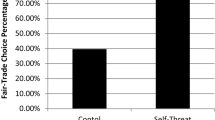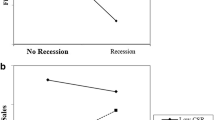Abstract
This research examines how ethical and unethical corporate behavior influence the perceived value of a firm's products, operationalized as the price consumers are willing to pay for that product relative to the competition. We propose that if consumers expect companies to conduct business ethically, then ethical behavior will not be rewarded but unethical behavior will be punished. The results of the first study confirm this expectation. The second study explored ways a firm can improve the perceived value of its products after an unethical act has been committed. Our results indicate that after a firm has committed an unethical act, consumer's perceptions of that company and its products were positively influenced by ethical behavior, corporate philanthropy, and cause-related marketing. However, our analyses revealed that these different strategies varied in their effectiveness. The third study used a choice task, rather than a judgment task, to confirm the finding that corporate behavior does influence perceived product value and is therefore likely to influence market choices. The implications of these findings are discussed.
Similar content being viewed by others
References
Abbott, Walter F., and Joseph R. Monsen. (1979). “On the Measurement of Corporate Responsibility.” Academy of Management Journal 22 (September), 501–515.
Addelman, Sidney. (1962). “Symmetrical and Asymmetrical Fractional Factorial Plans.” Technometrics 4 (February), 47–58.
Alexander, Gordon J., and Buchholz, Rogene A. (1978). “Corporate Social Responsibility and Stock Market Performance.” Academy of Management Journal 21 (September), 479–486.
Aupperle, Kenneth E., Archie B. Carroll, and John D. Hatfield. (1985). “An Empirical Examination of the Relationship Between Corporate Responsibility and Profitability.” Academy of Management Journal 28 (June), 446–462.
Bhide, Amar, and Howard H. Stevenson. (1990). “Why Be Honest If Honesty Doesn't Pay.” Harvard Business Review 68 (September–October), 121–129.
Bowman, James S. (1976). “Managerial Ethics in Business and Government.” Business Horizons 19 (October), 48–54.
Bunch, David S., Jordan J. Louviere, and Don Anderson. (1994). “A Comparison of Experimental Design Strategies for Multinomial Logit Models: The Case of Generic Attributes.” Working paper, Graduate School of Management, University of California at Davis.
Cochrane, Philip L., and Robert A. Wood. (1984). “Corporate Social Responsibility and Financial Performance.” Academy of Management Journal 27 (March), 42–56.
Dubinsky, Alan J., Eric N. Berkowitz, and William Rudelius. (1980). “Ethical Problems of Field Sales Personnel.” MSU Business Topics 28 (Summer), 11–16.
Ferrell, O.C., and Larry G. Gresham. (1985). “A Contingency Framework for Understanding Ethical Decision Making in Marketing.” Journal of Marketing 49 (Summer), 87–96.
Green, Paul E., and Yoram Wind. (1975). “New Way to Measure Consumers' Judgments.” Harvard Business Review 53 (July–August), 107–117.
Huber, Joel, and William James. (1976). “The Monetary Worth of Physical Attributes: A Dollarmetric Approach.” Krannert Graduate School of Management Working Paper 579.
Huber, Joel, and Klaus B. Zwerina. (1995). “The Importance of Utility Balance in Efficient Choice Designs.” Working paper, Fuqua School of Business, Duke University.
Hunt, Shelby D., Lawrence B. Chonko, and James B. Wilcox. (1984). “Ethical Problems of Marketing Research.” Journal of Marketing Research 21 (August), 309–324.
Kahneman, Daniel, and Amos Tversky. (1979). “Prospect Theory: An Analysis of Decision Under Risk.” Econometrica 47 (March), 263–291.
Murphy, Patrick E., and Gerry R. Laczniak. (1981). “Marketing Ethics: A Review with Implications.” In Ben M. Enis and Kenneth J. Roering (eds.), Review of Marketing (pp. 251–266). Chicago: AMA.
Oliver, Richard L. (1980). “A Cognitive Model of the Antecedents and Consequences of Satisfaction Decisions.” Journal of Marketing Research 17 (Novermber), 460–469.
Oliver, Richard L., and John E. Swan. (1989). “Equity and Disconfirmation Perceptions as Influences on Merchant and Product Satisfaction.” Journal of Consumer Research 16 (December), 372–383.
Robertson, Diana C., and Erin Anderson. (1993). “Control System and Task Environment Effects on Ethical Judgment: An Exploratory Study of Industrial Salespeople.” Organizational Science 3(4), 617–644.
Thaler, Richard. (1985). “Mental Accounting and Consumer Choice.” Marketing Science 4 (Summer), 199–214.
Tybout, Alice M., and Gerald Zaltman, (1974). “Ethics in Marketing Research: Their Practical Relevance.” Journal of Marketing Research 11 (November), 357–368.
Vance, Stanley C. (1975). “Are Socially Responsible Corporations Good Investment Risks?” Management Review 64(8), 19–24.
Westbrook, Robert A., and Richard L. Oliver. (1991). “The Dimensionality of Consumption Emotion Patterns and Consumer Satisfaction.” Journal of Consumer Research 18 (June), 84–91.
Woodruff, Robert B., Ernest R. Cadotte, and Roger L. Jenkins. (1983). “Modeling Consumer Satisfaction Processes Using Experience-Based Norms.” Journal of Marketing Research 20 (august), 296–304.
Author information
Authors and Affiliations
Rights and permissions
About this article
Cite this article
Creyer, E.H., Ross, W.T. The impact of corporate behavior on perceived product value. Market Lett 7, 173–185 (1996). https://doi.org/10.1007/BF00434908
Issue Date:
DOI: https://doi.org/10.1007/BF00434908




